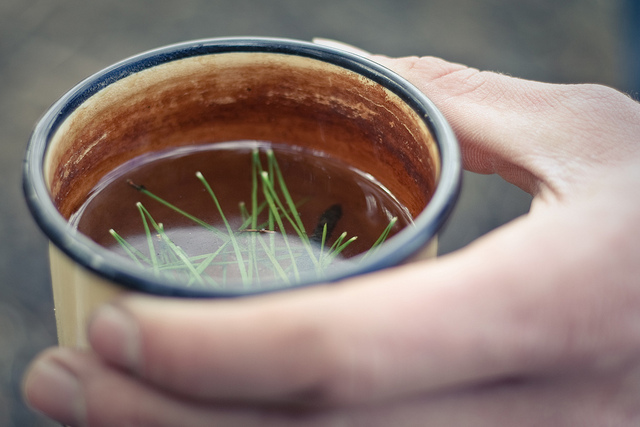Pine Needle Tea
Pine Needle Tea has been a common beverage in the survival and outdoor community; however, new studies suggest it may be even more beneficial than originally thought!
Researchers have recently discovered that pine needle tea is loaded with vitamins A & C! This is good news for anyone in a survival/disaster situation who has limited nutritional resources or anyone who prefers natural teas to pills and chewables. Vitamins A and C are crucial to the proper function of the human body. Most of us have already heard the scurvy horror stories that befell sailors who were stuck aboard ships for long journeys across the ocean. It was later discovered that consuming oranges kept the mystery illness at bay. This, of course, was the result of the powerful antioxidant, Vitamin C, found in those oranges.
Antioxidants are required to maintain a healthy immune system, skin, eyes, cardiovascular health, bones, teeth and proper healing for wounds. Basically everything necessary to sustain a healthy body. So you can see how having Vitamins A and C would be, could be, a lifesaver in a survival situation, and that could be from pine needle tea! According to the Nutrition Data web site, the amount of Vitamin C in pine needle tea is reported to be 5 times the amount of just one lemon!
In addition, pine needle tea is also packed with Vitamin A, a necessary part of healthy immune function, healthy vision, skin renewal and aids in the prevention of infections. Because of those anti-infection properties, pine needle tea is also commonly used as an expectorant and an antiseptic wash by herbal healers.
Researchers are still exploring other benefits and uses of pine needle tea and other pine based foods including the bark, seeds and resin. I’m sure they are plentiful considering Native Americans have been consuming & utilizing these gifts for generations.
Preparing Pine Needle Tea is pretty simple:
1) Bring water to rapid boil.
2) Add collected and cleaned pine needles.
3) Steep until needle color begins to pale.
4) Filter out needles and drink
WARNING: NOT ALL PINE IS SAFE FOR CONSUMPTION/ PREGNANT WOMEN SHOULD NOT CONSUME PINE NEEDLE TEA
According to several sources the Yew contains taxine, deemed toxic to humans, Norfolk Island Pine is found to be toxic to animals, so human consumption is questionable. The Pondersa Pine is unsafe for pregnant women as it causes the uterus to contract.
So many pine trees look alike, please do extensive research before you run outside and grab a handful of random pine needles. As with all posts, use at your own risk.
Image courtesy Laurynas Mereckas, with permission














